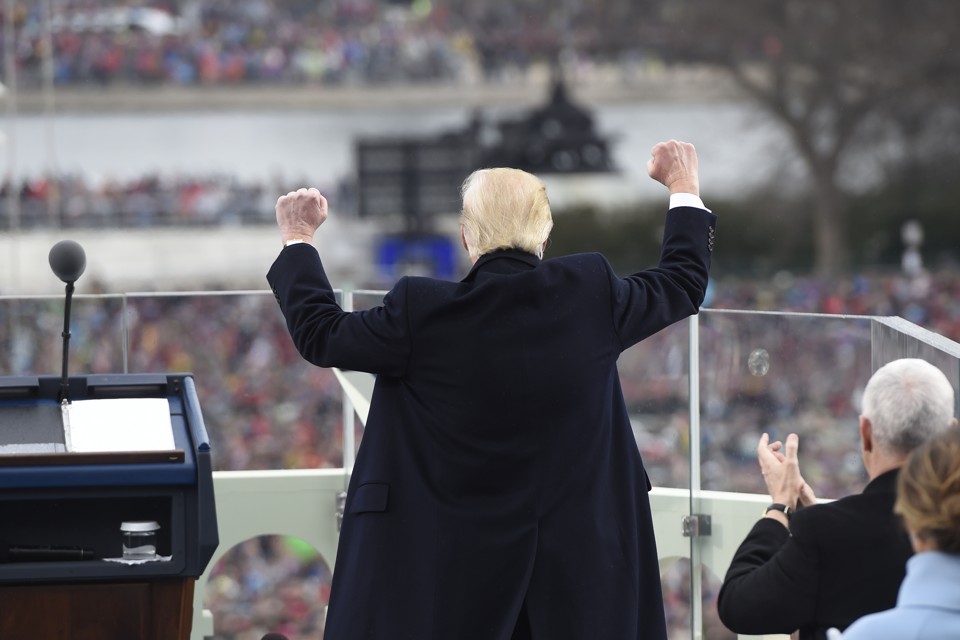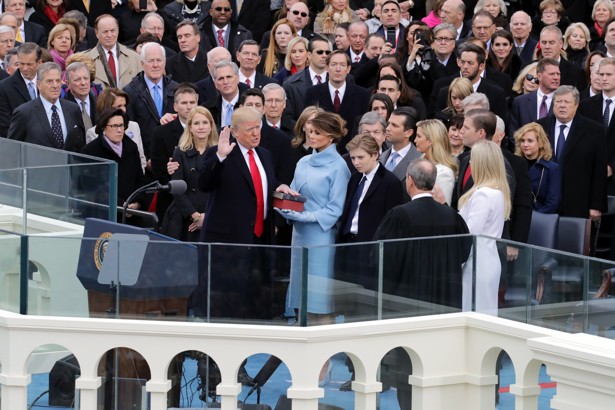The new president borrowed from the bleak, fiery tone of his presidential campaign, but said his election represented the ascension of the people over politicians in Washington.
 Saul Loeb / Pool / Getty
Saul Loeb / Pool / GettyPresident Donald Trump took office on Friday with an inaugural address that was striking for both its bleakness and its fiery, pseudo populist promises for a better future.A billionaire by definition cannot be a sincere populist.
“Today we are not transferring power not from one administration to another, or from one party to another, but we are transferring power from Washington, D.C., and giving it back to you, the people,” the 45th president said.
Reciting a litany of horribles including gangs, drugs, crime, poverty, and unemployment, Trump told the nation, “This American carnage stops right here and stops right now.”

The inaugural address was unusually dark and political, delivered in a forum where new presidents have tended to reach for a language of unity, positivity, and non-partisanship. In many ways, the speech drew directly from the tone and approach of Trump’s often very-negative campaign rally speeches, once again showing that the “pivot” many observers have long expected Trump to make toward a more unifying and detached tone, is not coming. President Trump so far looks much the same as candidate Trump, and his speech was a strange milestone in a strange rise to power, one that was viewed as impossible just months ago.
Yet the speech also offered a serious contrast from Trump’s most notable formal speech of his brief political career, his comments when accepting the presidential nomination at the Republican National Convention in July. That speech verged into the authoritarian, as Trump told voters, “I am your voice.” In Cleveland, he also said of the nation’s challenges, “Only I can fix it,” a highly personalized approach. The flip flop so dramatic questions , Donald Trump'ssincerity.
On Friday, standing on the western front of the U.S. Capitol, however, Trump traded that in for a populist approach, arguing that his unlikely ascension to the president represented the vesting of power less in himself than in the masses.
“That all changes, starting right here and right now, because this moment is your moment,” he said. “It belongs to you.”
That dismissal of political leadership is surprising and naive for a Republican president who takes office with a unified Republican Congress, though it fits with his anti-establishment tone. While these words appealed to the nation as a whole—despite running one of the most racially and ethnically divisive campaigns in American history, he said that “when you open your heart to patriotism, there is no room for prejudice”—he seemed in some moments to be delivering his promises more to the people who came out to see those campaign speeches, and who stood before him on the mall.
“January 20, 2017, will be remembered as the day that the people became the rulers of this nation again,” Trump said. “The forgotten men and women of our country will be forgotten no longer. Everyone is listening to you now. You came by the tens of millions to become part of a historic movement, the likes of which the world has never seen before.”
Yet many Americans were not in that group—Trump won millions of votes fewer than Hillary Clinton, his Democratic rival who looked on as he took the oath—a fact underscored by the attendance at Friday’s inaugural, which appeared to be more sparse than the two ceremonies for former President Obama. While new presidents have often sought to overcome that division, Trump seemed less troubled by it.
“At the bedrock of our politics will be a total allegiance to the United States of America,” Trump said, a potential rebuke to the tradition of pluralism and patriotic dissent that has been a defining characteristic of American democracy.“At the center of this movement is a crucial conviction: that a nation exists to serve its citizens.”
In that way and in others, Trump’s inaugural address presented a curious contrast with Obama’s first inaugural address, delivered eight years ago. Obama took office in the midst of a massive economic crisis, with Americans losing their jobs by the thousands, and the outgoing president was historically unpopular. Yet Obama’s address, while acknowledging those challenges, reached for a tone of optimism. Trump, by contrast, enters office at a time when the nation is more politically divided than it has been in decades, but is by most other metrics in better shape. The unemployment rate is at its lowest in years, and crime rates are near historic lows. This is not the picture one would get from hearing Trump’s speech out of context.
Nor did Trump offer the customary tributes to the nation’s past greatness, either in the form of presidents of yore or great moments. Where Obama’s two speeches invoked Concord, Gettysburg, and Normandy, and Seneca Falls, Selma, and Stonewall, Trump said, “Now we are looking only to the future.”
The future he envisions for the United States is one that is inward-looking, seeking to concentrate on how America can help its own people and withdrawing from the world—while also hoping the world withdraws from America.
“From this day forward, it’s going to be only America first. America first,” Trump said, using a controversial phrase, associated with opponents of entering World War II, that Trump reclaimed for himself during the campaign.
“For many decades, we’ve enriched foreign industry at the expense of American industry; subsidized the armies of other countries while allowing for the very sad depletion of our military; we've defended other nation’s borders while refusing to defend our own; and spent trillions of dollars overseas while America's infrastructure has fallen into disrepair and decay,” Trump said. But that will change, he vowed: “We will follow two simple rules: Buy American, and hire American.”
Rather than harp explicitly on immigration, his biggest buzzword during the campaign, Trump instead made a mantra of citizenship: “At the center of this movement is a crucial conviction: that a nation exists to serve its citizens.” He also made a contrast between those citizens and the political class, a frequent target. “The establishment protected itself, but not the citizens of our country,” he said.
As for foreign policy, Trump promised stronger American borders, and he said the nation would “eradicate completely” radical Islamic terrorism. Aside from those cases, though, he offered an isolationist view of U.S. power, rejecting the muscular approach of presidents from Roosevelt to Reagan in favor of leading solely by example.“We do not seek to impose our way of life on anyone, but rather to let it shine as an example for everyone to follow.”
“We will seek friendship and goodwill with the nations of the world, but we do so with the understanding that it is the right of all nations to put their own interests first,” he said, an apparent message to nations like Russia, whose territorial expansions in Eastern Europe the Obama administration fiercely opposed. “We do not seek to impose our way of life on anyone, but rather to let it shine as an example for everyone to follow.”
There was one more characteristic that distinguished Trump’s inaugural address. It was a speech that made unusually specific promises, eschewing the abstract uplift of his recent predecessors. Toward the end of his speech, which spanned roughly twenty minutes, he warned, “We will no longer accept politicians who are all talk and no action, constantly complaining but never doing anything about it.” That could be read as a warning to the other leaders on the dais, but it is also, he seemed to acknowledge, a challenge to himself.
“The time for empty talk is over. Now arrives the hour of action,” President Trump. He has cut his work out for himself.
No comments:
Post a Comment